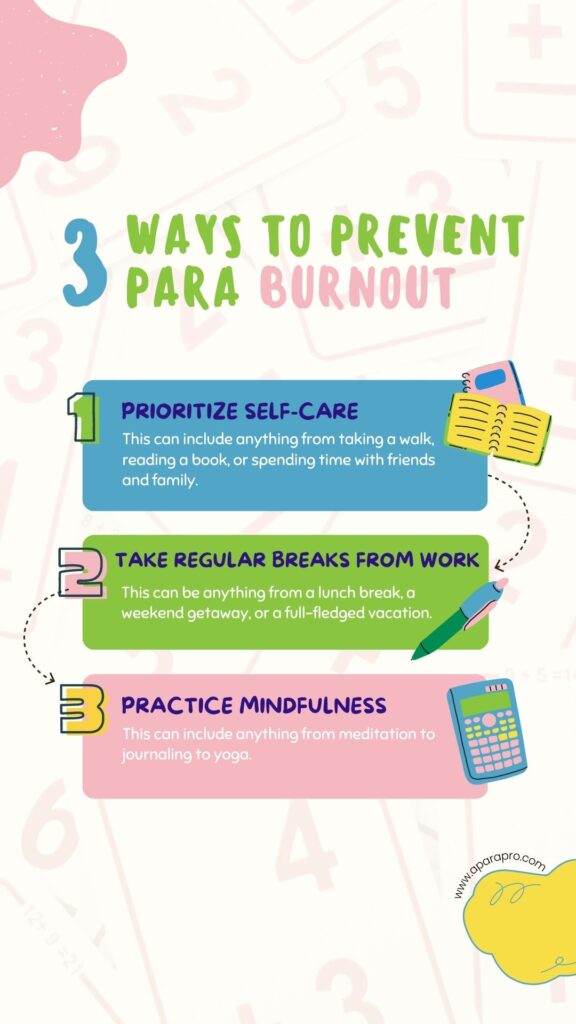Don’t Let Paraeducator Burnout Get the Best of You: Strategies For Avoiding Paraprofessional Fatigue
A couple of years ago I was working with a para that was always joyful and helpful para but after a while, I noticed she started coming in late, became short with the students, was on her phone a lot and once even pulled a no-call no-show. She was experiencing paraeducator burnout and wasn't sure how to help her.

Paraeducators are a critical part of the educational system. They provide invaluable support to students, teachers, and administrators in a variety of roles. But with such an important and demanding job, it can be easy to become overwhelmed and burn out.
So if you've been wondering if you or a para you know are experiencing paraeducator burnout and are running on fumes. In this blog post, we'll get down to the nitty-gritty of what paraeducator burnout is, the signs and causes, and strategies for avoiding it. Let's dive in!
What is Paraeducator Burnout?
Paraeducator burnout is a common experience among paras in the education field. It is a state of physical, emotional, and mental exhaustion caused by the stressors of the job. It can have a negative impact on the quality of work, relationships, and overall well-being of the para.

Burnout is a complex issue and can occur for a variety of reasons. Some of the most common causes of paraeducator burnout include:
- lack of resources – Paraeducators often lack the necessary tools and materials to do their jobs effectively. This can lead to them feeling overwhelmed and frustrated. Additionally, a lack of support from supervisors can also compound the problem.
- lack of support from supervisors – Without someone to provide guidance and support, paraeducators may feel lost and undervalued.
- feeling overwhelmed by the workload – Paraeducators are often tasked with a wide range of responsibilities, from helping students to running errands for the classroom, or translating for a staff member. Without enough time to accomplish all of the tasks, paraeducators can quickly become overwhelmed and frustrated.
- working in a hostile environment – Paraeducators are often faced with difficult students, uncooperative peers, and hostile administrators. Without a safe and supportive environment, paraeducators can quickly become drained and unable to perform their duties.
- lack of recognition – Paraeducators often feel overlooked and unappreciated for their hard work.
- and feeling undervalued for the work you do – Without recognition or appreciation, paraeducators can quickly become frustrated and disillusioned with their work.
Signs of Paraeducator Burnout
The signs of paraeducator burnout are often subtle and easily overlooked. Common signs include:

- feeling overwhelmed,
- irritability,
- fatigue,
- difficulty concentrating,
- difficulty making decisions.
- feeling disconnected from colleagues and students,
- feeling resentful or apathetic towards the job,
- and having a negative attitude.
Some physical signs of burnout can also include:
- headaches,
- frequent illness,
- and changes in sleeping patterns.
It is important to recognize these signs before they become more serious.
How to Recognize the Signs of Burnout and Take Preventive Measures
Recognizing the signs of burnout is the first step in taking preventative measures. It is important to be aware of how you are feeling and to take steps to address any issues that arise.

One of the best ways to prevent burnout is to establish a healthy work-life balance. This includes:
- set boundaries between work and personal life – This means that after you leave work, you should try to disconnect from it as much as possible. It is also important to set limits for yourself to ensure that you are not working too much and that you are taking the time to focus on your personal life and pursuits.
- make time for yourself – This could involve taking a leisurely walk, reading a book, listening to music, or doing something else that helps you relax and unwind. This will help you to de-stress and have a more positive outlook on life.
- It is also important to take breaks throughout the day to recharge and refocus – It is important to take regular breaks throughout the day, even if they are just 5-10 minutes long. Taking a few minutes to step away from your desk, ask another para to watch your student, and take a breather. This can make all the difference in your productivity and mental well-being.
Another key factor in preventing burnout is communication. Make sure to communicate your needs to your supervisor and colleagues. This can include anything from additional resources to changes in your workload or transfer within the district.
Strategies for Avoiding Paraeducator Burnout
When it comes to avoiding burnout, there are a few key strategies that can be implemented.

- Prioritize self-care. This includes making time for activities that bring joy and relaxation. This can include anything from taking a walk, reading a book, or spending time with friends and family.
- Take regular breaks from work. This means setting aside time for yourself to step away from the job and recharge. This can be anything from a lunch break, a weekend getaway, or a full-fledged vacation. Taking a break from work can help to reduce stress and increase productivity in the long run.
- Practice mindfulness. This means taking the time to be present and mindful of your thoughts and feelings. This can include anything from meditation to journaling to yoga.
The Importance of Self-Care
Self-care is an important part of avoiding paraeducator burnout. It is a way to prioritize yourself and your well-being. It is important to remember that taking care of yourself is not selfish but necessary to avoid burnout and to truly be present to care for your students and your loved ones.
Self-care activities can help to reduce stress and give you the energy you need to be effective in your job. They can also help to improve your overall well-being and make you more productive in the long run.
Self-Care Activities to Reduce Paraeducator Burnout
There are a variety of self-care activities that can help to reduce paraeducator burnout. These can include anything from:
- taking a walk – can be a great way to clear your head and get away from the stresses of the job for a little while. Walking can also be a great form of exercise, and exercise is known to be a great way to reduce stress and improve overall mental health. Going for a walk can also give you some time to reflect on the day and what you may need to improve or do differently in the future.
- listening to music – Music is a great way to relax, unwind and forget about the stress of the job. Create a playlist of your favorite songs and let the music take you away.
- reading a book – Reading for pleasure can help to reduce stress and provide an escape from the stress and demands of the job. A book can be a great way to take your mind off of your worries and immerse yourself in a different world. Curl up with a good book and lose yourself for a few hours.

- writing in a journal – is a great tool for managing stress. Writing down your thoughts and feelings can be incredibly therapeutic and help you identify what’s causing you stress. Writing can also help you sort out your thoughts and gain some perspective.
- spending time with friends and family – an important part of self-care. Make sure that you take the time to talk and really connect with the people who are closest to you. Talking to them can help you to feel supported and loved, which can help reduce your stress levels.
- getting enough sleep – Sleep is a crucial part of self-care and can help restore balance to your body and mind. Sleep deprivation can lead to a variety of problems, so make sure that you get enough rest each night.

It is also important to take regular breaks from work. This can include anything from a 1min break to a weekend getaway, or a full-fledged vacation. Taking a break from work can help to reduce stress and increase productivity in the long run.
Benefits of Taking a Break
Taking regular breaks is an important part of avoiding paraeducator burnout. Taking a break can help to reduce stress and give you the opportunity to recharge and refocus. It can also help to improve your overall well-being and make you more productive in the long run.
Taking a break can also give you the chance to step away from the job and focus on other aspects of your life. This can include anything from spending time with friends and family, pursuing hobbies, or exploring new interests.
How to Identify When It’s Time to Take a Break
Sometimes it can be difficult to know when it is time to take a break. In these cases, it is important to be aware of your body’s signals and take action accordingly.

If you are feeling overwhelmed, irritable, or fatigued, it may be time to take a break. Other signs that you may need a break include difficulty concentrating, feeling disconnected from colleagues and students, and having a negative attitude.
It is also important to take regular breaks regardless of how you are feeling. This can help to prevent burnout and give you the opportunity to recharge and refocus.
Mindfulness Benefits
Mindfulness is a practice that helps us to become aware of our thoughts and feelings in the present moment. By taking time to practice mindfulness, paraeducators can gain perspective and become more aware of their own emotions, reactions, and behavior. This can help them better understand the needs of the students they serve, as well as the stresses they may be under while working in the classroom.
Mindfulness also helps paraeducators take a break from the constant demands of their job. Taking time to focus on your breath and body can help you reset and gain clarity and focus. This can help reduce stress, improve job satisfaction, and increase mental clarity and energy.
Mindfulness Activities
Paraeducators can use mindfulness practices to help them stay connected to their work and gain greater job satisfaction. Here are a few simple mindfulness activities that paraeducators can incorporate into their day-to-day lives:

- Mindful breathing: Take a few moments each day to sit comfortably and focus on your breath. Notice how your body feels, and how your breathing can help to reduce stress and tension.
- Body scan: Another great way to practice mindfulness is through a body scan. Focus on each body part in turn, noticing how it feels and any sensations or emotions you may be experiencing.
- Mindful walking: Take a mindful walk around your work environment and try to become aware of your surroundings. Notice the sights and sounds, how your body feels, and how your breath is moving.
- Mindful eating: Eating can be a great opportunity to practice mindfulness. Focus on the flavors and textures of your food and take your time when eating.
- Gratitude practice: Take time each day to think of something you appreciate in your work environment or with the students you work with. This can help remind you of the importance of your work and help to foster a sense of gratitude and joy.
By incorporating mindfulness into your work as a paraeducator, you can help yourself and the students you serve. Taking time to practice mindfulness can help you to stay connected to your work, improve relationships with students, reduce stress, and increase job satisfaction.
Reaching Out for Help
Out of all the strategies, this is the most important. Many paras wait for dire circumstances to finally admit they are burnout and by then they have burned bridges and put their job on the line. No one is in your head so if you are feeling overwhelmed or burnt out, it is important for you to reach out for help. This can include talking to a trusted colleague, supervisor, or family member.

If you would rather speak to someone anonymously t is also important to take advantage of the many resources that may be available through your work benefits. Such as employee assistance programs or counseling services. I know you've read these posters in the bathrooms, staff rooms, and office.
Asking and taking help is not a sign of weakness but a sign of strength.
When we ask for help, we often feel as though we’re admitting our own inadequacies—that we aren’t smart or capable enough to do something ourselves. But the truth is, asking for help simply means that we understand our own limits and are aware of the resources available to us. It’s a sign that we’re willing to reach out and accept the assistance we’re offered.

There is also great strength in taking help from others. Being willing to accept assistance from someone else shows that you are humble enough to understand that you may not know everything and that you don’t have to do everything by yourself. It shows that you are open to learning and improving and that you are willing to accept help in order to grow.
It can be difficult to ask for help, especially when we’re used to relying on ourselves. But we all need help from time to time, and it’s okay to reach out and accept it when it’s offered.
Resources for Paraeducators Experiencing Burnout
There are a variety of resources available for paraeducators experiencing burnout. These can include employee assistance programs, counseling services, and online support groups. It is also important to reach out to your supervisor or colleagues for support. I've also listed a few books on educator burnout if you want to learn more.
Self-Care Challenge for Paraeducators
If you're feeling overwhelmed or burnt out, join my 30-Day Self-Care Challenge for Paraeducators. This challenge is designed to help you take the time to prioritize your well-being and take steps to prevent burnout.

Conclusion
Paraeducator burnout is a common phenomenon in the education field. It can have a negative impact on the individual's life. It is important to be aware of the signs and causes of burnout and take steps to address any issues that arise. I wish I did so I could have helped my friend. Since she had 13 years with the district they were kind to her and transferred her to a different position instead of firing her. At first, she was upset about the transfer but in the end, it turned out to be a blessing.

To recap the best way to prevent burnout is to prioritize self-care and make time for activities that bring joy and relaxation. It is also important to take regular breaks from work and practice mindfulness. Finally, and most important is to reach out for help when needed in order to continue to provide the best support to students and colleagues. How are you going to prevent paraeducator burnout today? Let me know in the comments below.






